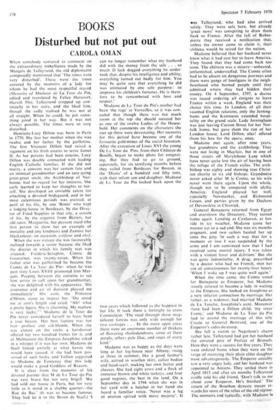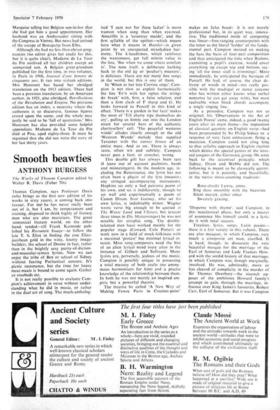BOOKS Disturbed but not put out
CAROLA OMAN
When somebody ventured to comment on the extraordinary misalliance made by the Marquis de Talleyrand, the old diplomatist composedly mentioned that 'The times were very disturbed'. These were the times covered by the memoirs of a lady for whom he had the most respectful regard (Memoirs of Madame de La Tour du Pin, edited and translated by Felice Harcourt, Harvill 50s). Talleyrand cropped up con- tinually in her story, and she liked him,
though she sadly realised he was not at all straight. When he could, he put some- thing good in her way. But it was not always possible. The times were so very disturbed.
Henriette-Lucy Dillon was born in Paris in 1770. She lost her mother when she was twelve and her father by the guillotine.
The first Viscount Dillon had raised a regiment on his Irish estates to serve James
II. As her parents had been cousins, Lucy
Dillon was doubly connected with leading English Catholic families. If she did not marry, a convent was her certain fate and an inimical grandmother and an easy-going great-great uncle, the Archbishop of Nar- bonne, had no regard for her interests. She early learned to keep her thoughts to her- self. She developed an enviable talent for attaching a devoted bodyguard, and in her most calamitous periods was assisted, at peril of his life, by one 'Bonie' who kept a lodging-house in Bordeaux, by the Direc- tor of Food Supplies in that city, a cousin of his, by the organist from Beziers, her old tutor, Marguerite, her peasant maid (the first person to show her an example of morality and any kindness) and Zamore her
blackamoor, on occasion, coiffeur and chef. When she was sixteen she was favourably inclined towards a suitor because she liked
the district in which his family seat was situated. Frederic-Seraphin, Comte de Gouvernet, was twenty-seven. When his father also was guillotined he became the Comte de La Tour du Pin: when he was past sixty Louis XVIII promoted him Mar- quis. Peeping between the curtains to see him arrive to call upon her grandmother, she was delighted with his appearance. 'His assurance and air of decision pleased me immediately'. His aunt, the Princesse &Herrin, came to inspect her. 'She stood me at arm's length and cried, "Ah! what a pretty figure. She is charming. My nephew is very lucky."' Madame de la Tour du Pin never considered herself to have been a true beauty. Her best feature was her hair--profuse and ash-blonde. When she was almost on the rocks a hairdresser offered her two hundred francs for it, and at Malmaison the Empress Josephine asked in a whisper if it was her own. Madame de Stael hinted awfully at what havoc she would have caused, if she had been pos- sessed of such looks, and Tallien suggested to Madame de Fontenay that this lady would make a good Goddess of Reason.
It is clear from the memoirs of his devoted partner that M de La Tour 4u Pin was very brave but not very bright 'We had sold our house in Paris, but for very little as it stood in a shabby quarter—the Rue du Bac.' (It was to become famous. They had let it to the Baron de Stael.) 'I
can no longer remember what my husband did with the money from the sale . . . so much ill luck dogged everything he under-
took that, despite his intelligence and ability, everything turned out badly for him. You may be quite sure that everything he did was animated by one sole purpose: to improve his children's fortunes. He is there- fore to be remembered with love and respect.'
Madame de La Tour du Pin's mother had been 'the rage' at Versailles, so it was con- ceded that though there was not much room at the top she should succeed her as one of the twelve Ladies of the House- hold. Her comments on the characters she met up there were devastating. Her memoirs for this period have become one of the favourite gold-mines of the social historian. After the execution of Louis XVI the young De La Tour du Pins, from their Château de Bouilh, began to make plans for emigrat- ing. But they had to go to ground, separately, for six terrifying months before they sailed from Bordeaux for Boston, in the 'Diana' of a hundred and fifty tons, with their infant son and daughter. Madame de La Tour du Pin looked back upon the
two years which followed as the happiest in her life. It took them a fortnight to cross Connecticut. 'The road through those mag- nificent forests was only wide enough for two carriages . . . In the more open areas there were an enormous number of thickets of flowering rhododendrons, some of them purple, others pale lilac, and roses of every kind.'
Madame was as happy as the days were long at her log-house near Albany, rising at three in summer, like a good farmer's wife, attired in woollen skirt, calico bodice and head-scarf, making her own butter and cheeses. She had eight cows and a flock of immense brown and white turkeys, and four good negroes, the best in the land. On a September day in 1794 when she was in her yard with a hatchet in her hand she heard a familiar voice, 'Never was a leg of mutton spitted with more majesty'. It was Talleyrand, who had also arrived safely. They were safe here, but already 'great news' was conspiring to draw them back to France. After the fall of Robes- pierre they received a notification that, unless the owner came to claim it, their château would be seized for the nation.
Madame believed that her husband never knew what it had cost her to leave America. They found that they had come back too soon. The château was a misery—unheated, unfurnished, understaffed. The Comte often had to be absent on dangerous journeys and there were gangs of hooligans in the neigh- bourhood who burned people until they admitted where they had hidden their money. On 4 September, 1797, a decree was issued ordering all émigrés to leave France within a week. England was their choice this time. In London, of all their vaunted English relations, only the Jerning- hams and the Kenmares extended hospi- tality on the grand scale. Lady Jerningham was just leaving Curzon Street for her Nor- folk home, but gave them the run of her London house. Lord Dillon, alas! offered them his box for the opera, once.
Madame met again, after nine years, her grandmere and the archbishop. They were not living in. Mayfair, but in one of those streets off Marylebone Lane which have never quite lost the air of having been the refuge of the French exiles. The arch- bishop was eighty and showing true Christ- ian charity to six old bishops. Grandmere never asked after M le Comte, so his wife never went there again. Upon the whole, though not to be compared with idyllic America, England pleased her well, especially Newmarket, and Richmond Green, and parties given by the Duchess of Devonshire at Chiswick.
General Bonaparte returned from Egypt and overthrew the Directory. They turned home again. Landing at Cuxhaven, at low tide in icy weather, Madame came her nearest yet to a sad end. She was six months pregnant, and two sailors hauled her up onto the jetty 'in such a way that for a moment or two I was suspended by the arms and I am convinced now that I had received some mortal injury. I was taken with a violent fever and delirium.' But she was quite indomitable. A drug, prescribed by a doctor who had no French, shot her out of consciousness for twenty-four hours. When I woke up I was quite well again.'
When the time came, the Comte voted for Bonaparte as Emperor, but Madame stoutly refused to become a lady in waiting to the Empress. She looked on Josephine as a very inferior connection by marriage. Her father, as a widower, had married Madame de La Touche, Josephine's aunt. Moreover there had been a Dillon child, 'my sister Fanny,' and Madame de La Tour du Pin had to attend the marriage of this silly Creole to General Bertrand, one of the Emperor's aides-de-camp.
She fell a victim to Napoleon's charm rather late. Talleyrand had got her husband the coveted post of Prefect of Brussels. Here they were a success for five years. They were ordered home when they were on the verge of marrying their plain elder daughter most advantageously. The Emperor amiably saw a very angry lady, and her husband was appointed to Amiens. They settled there in April 1813 and after six months Talleyrand coolly told his old friend, 'Don't talk to me about your Emperor. He's finished.' The return of the Bourbon dynasty meant re- wards for most of the relics of the old regime. The memoirs end typically, with Madame la Marquise telling her Belgian son-in-law that she had got him a good appointment. Her husband was an Ambassador sitting with the Congress in Vienna. But news had arrived of the escape of Bonaparte from Elba.
Although she had no less than eleven preg- nancies (no editor gives her credit for this, but it is quite clear), Madame de La Tour du Pin outlived all her children except an unmarried son. A Belgian great-grandson published for the first time, in two volumes, in Paris in 1906, Journal d'une femme de cinquante ans. It ran into sixteen editions. Mrs Harcourt has based her abridged translation on the 1913 edition. There had been a previous translation, by an American author, in 1921, also abridged, Recollections of the Revolution and Empire. No previous edition has an index, a necessity where the authoress is so discursive, famous figures crowd upon the scene, and the whole may justly be said to be 'full of quotations.' Mrs Harcourt has also provided some helpful appendices. Madame rle La Tour du Pin died at Pisa, aged eighty-three. It must be regretted that she did not write the story of her last thirty years.



































 Previous page
Previous page